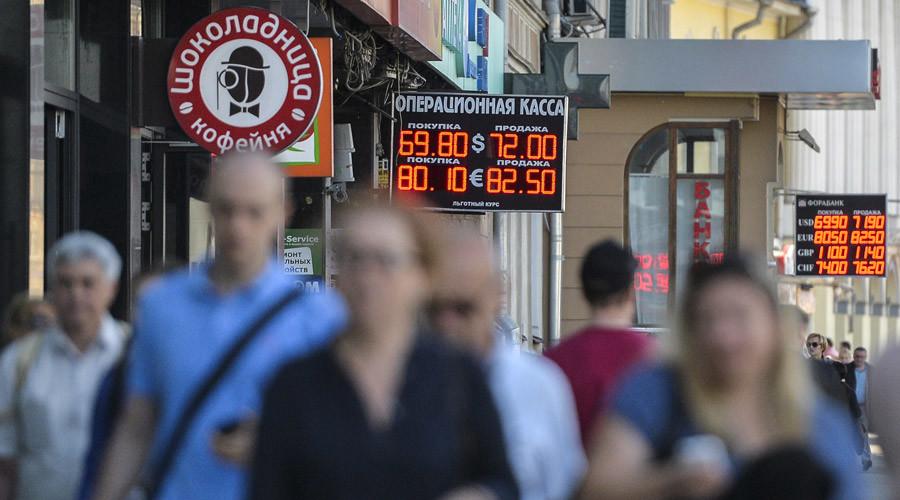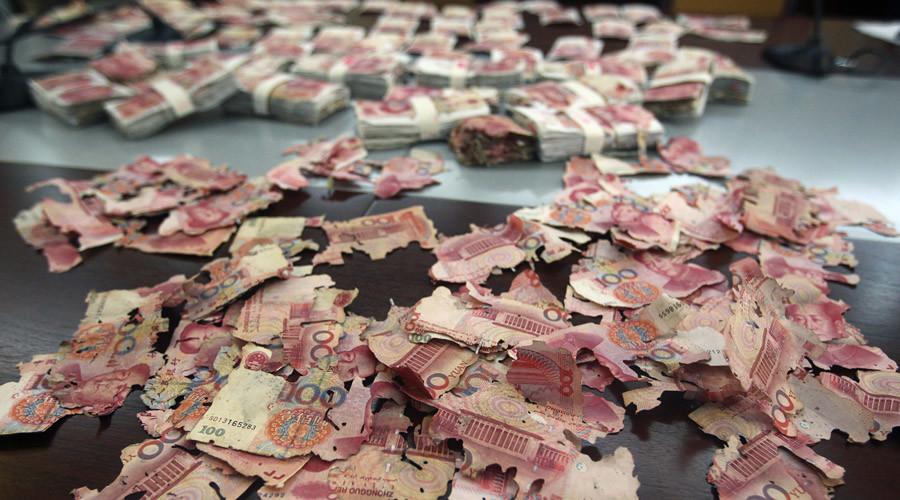Bullshit across the board from the Telegraph to RT. An 'oil glut' and the economy is in fine fettle - lol
Oil sinks below $35 as the plunge continues
Oil sinks below $35 as the plunge continues
WTI
hits a new six-year low while Brent continues to sink
14
December, 2015
Oil
fell below $35 a barrel in New York for the first time since 2009 as
Iran reiterated its pledge to boost crude exports, bolstering
speculation Opec members will exacerbate
the global oversupply.
WTI
for January delivery fell as much as 95 cents to $34.67 a barrel on
the New York Mercantile Exchange and was at $34.80 at 11:46am GMT.
The volume of all futures traded was 35pc above the 100-day average.
Brent
for January settlement dropped as much as $1.31, or 3.5pc, at $36.62
a barrel on the London-based ICE Futures Europe exchange, the lowest
since December 26, 2008. The European benchmark crude was at a
premium of $1.93 to WTI.
There’s
“absolutely no chance” Iran will delay its plan to increase
shipments even as prices decline, said Amir Hossein Zamaninia, the
nation’s deputy oil minister for international and commerce
affairs.
while speculators increased bets on falling US crude prices to an
all-time high after the Organisation of Petroleum Exporting Countries
effectively abandoned production limits.
Sanctions
lift on Iran early next year
The
supply glut will persist at least until late 2016 as demand growth
slows and Opec shows “renewed determination” to maximise output,
according to the International Energy Agency.
“Gloom
nourishes gloom,” said Eugen Weinberg, head of commodities research
at Commerzbank AG in Frankfurt. “The market is fully acknowledging
that Opec is no longer in price-control mode or providing a floor,
and that the group is unlikely to change that strategy any time
soon.”
US Exports
In
the US, Senate negotiators are nearing a deal to allow unfettered
crude oil exports for the first time in 40 years, though differences
remain on renewable-energy tax credits that Democrats are demanding
in return, according to people close to the discussions.
While
any agreement could still collapse in the coming days — the deal
faces opposition in the House — lawmakers are weighing the
extension of solar and wind tax credits for as long as five years in
exchange for lifting the crude-export restrictions, which were
established to counter the energy shortages of the 1970s.
Iran,
which expects international sanctions over its nuclear programme to
be lifted by the first week of January, has already secured
customers for its planned supply expansion, Mr Zamaninia said in an
interview in Tehran. The government is also preparing to offer oil
and natural gas contracts to investors. The country pumped 2.8
million barrels a day last month, data compiled by Bloomberg show.
Opec,
which set
aside its output quota at a meting on December 4,
is displaying hardened resolve to maintain sales, the IEA said in
its monthly report last week.
While
the group’s strategy has affected other producers, triggering the
steepest fall in non-Opec supply since 1992, world oil inventories
will probably swell further once Iran restores exports, the Paris-
based energy adviser predicted.
Ruble back to Black Monday lows on crude prices collapse

RT,
14
December, 2015
The
Russian ruble has dropped to its lowest exchange against the major
currencies since the August 24 collapse, dubbed Black Monday. A
plunge in global crude prices triggered the ruble's all.
At
its lowest point, the Russian currency was trading at more than 71
rubles to the dollar and over 78 against the euro.
The
Russian stock market traded lower Monday on the falling ruble and
oil. The dollar-denominated RTS Index was down more than two percent
as of 3:30pm GMT. The ruble-traded MICEX was less than one percent in
the red.
Crude
prices plunged to their lowest level since 2009 on global oversupply
and OPEC's decision not to cut record output. Brent crude fell to
less than $37 a barrel while the US benchmark WTI fell below $35 per
barrel.
After
the IMF downgraded its global economy forecast, Russian Finance
Minister Anton Siluanov said crude could slump to $30 per barrel in
2016 and could stay at that level throughout the year.
Currency clash: Yuan depreciation triggers wave of copycat moves from other countries http://on.rt.com/6pn4
"This suggests the demand for oil will also fall. The volume of oil reserves is large. Iran will return to the global market with one to one and a half million barrels per day - everything suggests that low oil prices will dominate next year," Siluanov told TASS.
The
Russian government is likely to adjust its 2016 budget, which
currently relies on oil at $50 a barrel and an exchange rate of 63.3
rubles to the US dollar.
Deputy
Finance Minister Maxim Oreshkin said Russia is drawing up plans based
on the oil price fluctuating between $40 and $60 until at least 2022.
A bit of nonsense from RT's guest
Crude falls below $35 a barrel for first time since 2009
WEEKEND ECONOMIC GLANCE, DEC. 7-13
Reports
have surface during the last weak that pain a dark future for Saudi
Arabia’s domestic economy. Russia has turned heads in the West by
announcing the introduction of a Russian futures market for oil.
Meanwhile Turkey is hit hard by capital flight and increased downward
pressure for the country’s currency as Syria struggles for new
sources of revenue to replace the oil and gas business in the
short-term.
Written
by Frank
Jakob exclusively
for SouthFront
McKinsey
consulting firm sees bleak future for Saudi Arabia.
McKinsey released a report in which it assesses Saudi Arabia’s
future prospect regarding its domestic job market. The report with
the title Saudi
Arabia beyond oil deals
particularly with the effect that the demographic development is
having on the unemployment rate. The authors argue that at least 4.5
million new working-age Saudis are expected to enter the domestic
labor market in fifteen years, however, the country lacks the
resources to create so many jobs, which would result in a jobless
rate of 20 percent by 2030. The fundamental reason blamed for the
lack of funds of the Saudi state is the loss in revenue from the
export of oil, the authors state. This goes in line with predictions
by the IMF which foresee Saudi bankruptcy by 2020 should the spending
policies not be changed drastically.
Russia
to introduce own oil benchmark to end “Wetstern Dominance” on
futures market. German
business newspaper Finanzmarktwelt has
released an article in which it deals with the newly announced
Russian oil futures market. So far there are only two markets like
this in the world, in News York and in London. Even though the United
States is a minor oil exporter on the global market, its Brent index
“virtually controls 70 percent of global oil trading”, the
authors write. Russian-produced Urals and Espo oil has a much
stronger presence on the oil market but no futures market free of
Western meddling. “It is clear that Russia wants to get rid of the
system which allows for oil prices to be set by London or Dubai,”
is the conclusion of the article. The West has been repeatedly
accused by members of the BRICS-states of manipulating the oil and
gold markets to its advantage. Earlier this year China announced the
formation of a gold bullion market to rival its counterpart in London
and to stop the manipulation on the global market.
Turkey
hit by massive capital flight.
Investors seem to have lost hope for the Turkish economy and have
continued to withdraw their investments from the country. As a result
the Turkish Lira saw its biggest annual fall since the world economic
crisis in 2008. So far investors have withdrawn $ 7.6 billion dollars
from the country, $ 1.4 billion alone after Moscow and Ankara had a
cool down of relations. Unlike Russia, Turkey is particularly
vulnerable to shifts in investor feelings due to its enormous debt.
Should the US Fed really decide to increase its rates in the near
future then Turkey will face the next crisis. Meanwhile Per
Hammarlund, chief emerging markets strategist at SEB in Stockholm
predicts a continuation of the fall of the Lira in December by
another 3.7 percent.
Syria
to introduce tax hikes to finance reconstruction. The
Syrian state has introduced several new taxes and increased already
existing ones in a bid to counter losses of revenues from the oil and
gas business. Sandwich tax, broadcast tax, electricity tax, lots of
areas of daily life have been affected by the move. Meanwhile Moscow
has offered Syria to replace Turkey as Russia’s main supplier for
citrus fruit, which would include around 700.000
tons of
mostly oranges, an offer that was happily received in Damascus.
The
Nikkei fell 3% at the opening bell in Tokyo while the continued
depreciation of the yuan added to fears that the economy is weaker
than expected
Asian
stocks have fallen sharply and the Chinese currency hit fresh
four-year lows as concern about crude oil prices and an expected US
rate rise by the Federal Reserve later this week kept investors on
edge.
European
markets seemed likely to follow suit after the People’s Bank of
China on Monday continued guiding the yuan lower, setting official
trading midpoint with the US dollar at its weakest since July 2011.
China’s
decision to loosen its grip on the yuan and allow slow but steady
depreciation in recent weeks has added to concerns that the world’s
second-biggest economy may be more fragile than expected.
Gerald Celente cuts throught some of the bullshit



 RT
RT



















No comments:
Post a Comment
Note: only a member of this blog may post a comment.